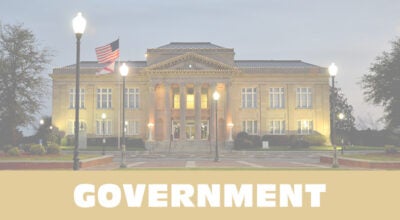Meckes: U.S. has arrived at day of fiscal crisis
Published 12:00 am Wednesday, November 13, 2013
After nine years in Washington, Doug Meckes, D.V.M., has a message he wants to share.
“We’re in big trouble,” he told Rotarians Tuesday.
Those are scary words from the man who leads the branch of Homeland Security responsible for the defense of U.S. agriculture and food. But that’s not the trouble of which he speaks.
“One of the things I’ve long been a student of is our fiscal state,” Meckes said. “They’re not telling us the truth.”
Meckes, an Alabama native, is a proponent of Come Back America, an organization devoted to promoting fiscal responsibility and sustainability in the same vein as the Concord Coalition.
“We have arrived at the day of our fiscal crisis,” Meckes said.
“I see do see people speak to it, but nobody speaks to what has to be done, and that is, we all have to work a little longer, expect a little less, and pay a little more.”
Meckes said the country can’t grow its way out of the fiscal crisis; it can’t increase taxes enough; it can’t cut spending enough, and it can’t inflate its way out.
Growing its way out would take double-digit growth in the gross domestic product for years, he said.
“We barely have single digit growth now,” Meckes said. “We’ve never had the kind of growth we’d need to grow our way out of it.
“Ultimately, there will be some inflation,” he said. “This is the cruelest form, because it hits people with fixed incomes the hardest.
“To tax our way out of this, by 2040, we’d have to double the tax rates we all pay,’ he said. “And we can’t cut spending enough. Most of the budget is mandatory costs.
“The discretionary portion, this year is 17 percent,” he said. “If we tried to cut our way to balance our budget to achieve fiscal sanity, by 2024, there would only be enough money to pay interest on our debt. There’d be no money for defense, not any of the other departments or agencies. Medicare and Social Security would consume the rest of it.”
It will take a combination of the four to fix things, he said.
“We’ve got to expect a little less, work a little longer, and pay a little more,” he repeated. “That’s too hard for elected officials to present in that fashion.”
The problem is neither red nor blue, he said, adding that the country has had deficit spending for years in both Republican and Democratic administrations, with the exception of a few years during Clinton’s administration.
“Nobody has a clean bill of health,” he said. “The parties are equally culpable.”
He used as an example of mandatory spending Medicare Part D, which is an annual $8 trillion expense.
“Not one penny of that is available to us, unless we choose to minimize some of those costs,” he said.
The biggest driver of government costs, outside of interest, is health care, he said. In 2011, health care represented 24 percent of the federal spending; by 2040, that number is projected to be 44 percent.
“At some point in time, we have to look at this and say, ‘What do we get for each $1 we invest,’ ” he said.
In 2010, the United States spent more on defense than the next 15 highest defense budgets combined.
“We may decide we no longer have the luxury of spreading democracy,” he said.
Meckes told Rotarians he hopes they will get from his message a desire to become more informed.
A number of think tanks have reached the same conclusions, eh said.
“It has to be more income, and fewer expenses. It has to be tax reform and entitlement reform.
“Nothing I see in Washington today suggests anyone is willing to have that conversation with the American people,” he said.
“Please, begin to think about this, and when your congressman comes to town, talk to (her) about it,” he said.





